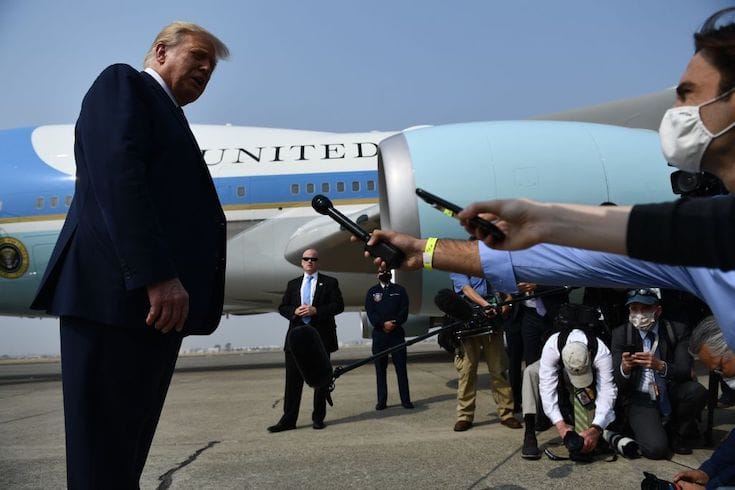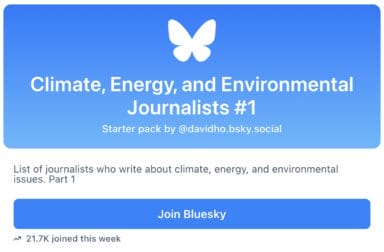Support CCNow’s mission of helping journalists
improve and expand their climate coverage. Donate Now.
Most mainstream news coverage has finally stopped “both-sides-ing” climate science. For decades, both-sides-ing gave bona fide scientists and peer reviewed research equal weight to fossil fuel industry–friendly flacks spouting nonsense. Although adopted in the name of balance, both-sides-ism ended up misleading the public by prioritizing the appearance of impartiality over the accurate presentation of facts.
Now, with Election Day fast approaching in the world’s largest economy and history’s top climate polluter, it’s essential that newsrooms not both-sides climate politics.
On August 17, the Washington Post published an unsigned editorial that gave the strong impression there is little difference between the climate policy outcomes of President Joe Biden and Vice President Kamala Harris and those of former president Donald Trump. Its headline even both-sides-ed the question of whether, as scientists have warned, this is a crucial election year for the future of the planet: “Does the climate depend on the 2024 election?” it asked. “Yes and no.”
The article’s first paragraph acknowledged that if Trump wins in November he would “surely ‘drill, baby, drill’ and undo Biden administration rules on power plants, cars, methane emissions and the like.” Then, in a tell-tale pivot, the second paragraph asserted that “such doomerism overstates how much President Joe Biden has accomplished — or a President Kamala Harris would accomplish — on cutting emissions….”
The piece went on to trash the Inflation Reduction Act, arguing that the largest investment in climate action in US history “will do relatively little to accelerate decarbonization,” largely because Biden supposedly was unwilling to reject environmentalists’ objections to permitting reform. (Oddly, the piece later conceded that Biden actually had endorsed reform.) The piece also cited — but didn’t name — the Breakthrough Institute, a research group with a history of “defending oil companies and cozying up to climate contrarians” that nevertheless had also defended the IRA as “a good deal for the climate.”
Ironically, the editorial ignored the most damaging part of Biden’s climate record: the massive expansion of US oil and gas production he oversaw. To understand the challenges a Harris administration would face in correcting that, one only had to read a story the Post published the day before the op-ed. Maxine Joselow’s thorough reporting highlighted two reasons why it’s hard for any US president to limit oil and gas production: The vast majority of production takes place on private land, and US law obligates the Interior Department to hold lease sales of public land quarterly and provide production permits to any entity possessing a lease.
The instinct to both-sides politics coverage is not confined to a single news outlet. Nor is it unique to this election cycle, as the 2016 Hillary Clinton email saga shows. But the planet is on fire. One candidate wants to add fuel to the flames. The other wants to douse those flames. Making that distinction clear is neither partisan nor advocacy. It is journalism.
From Us
Climate on the Ballot Summit. From September 17–19, join CCNow and top political and climate journalists for a virtual summit on integrating climate into your elections coverage. RSVP.
- If you haven’t already, sign up for CCNow’s weekly Climate on the Ballot newsletter.
- Check out the archive for story ideas and suggested themes for reporting on climate and US politics.
The Climate Station en español. The Climate Station es un programa de entrenamiento gratuito de Covering Climate Now que capacita a las salas de redacción de las estaciones de televisión locales de Estados Unidos, incluidos periodistas, productores y meteorólogos, para cubrir de manera más eficaz las noticias sobre el clima. Para consultas, envía un correo electrónico a Elena González a elena[at]coveringclimatenow[dot]org.
Watch recent CCNow webinars. Check out CCNow’s events archive for recordings about war and climate change, Vice President Kamala Harris’s climate record, making the climate connection during hurricane season, and more.
Via Social
Climate scientist and professor at University of Hawaii at Manoa, David Ho, has created a “starter pack” of climate, energy, and environmental journalists and outlets to follow on the social media platform Bluesky.
Noteworthy Stories
Disaster survival guide. What sources should you turn to for accurate information after an environmental disaster? What supplies do you need in an emergency kit? Where can you go for financial aid and support? In a recent edition of Grist’s State of Emergency series, Lyndsey Gilpin and Jake Bittle answer these questions.
Voters prioritizing climate. Increasingly, climate change is a top political issue for young American voters, according to a new Beacon Research poll. “The burden is upon us as voters first, because if we don’t show up, there’s no reason for politicians to appeal to our priorities,” said Nathaniel Stinnett, founder of the nonpartisan Environmental Voter Project. By Chase Cain for NBC News Now…
Harris’s climate vision? In the whirlwind month since Vice President Kamala Harris launched her campaign for the US presidency, she’s mentioned climate change only occasionally. “Green leaders” like Washington governor Jay Inslee, whose 2020 campaign focused on climate, are fine with that. “I am not concerned,” said Inslee. “I am totally confident that when she is in a position to effect positive change, she will.” By Lisa Friedman for The New York Times…
- In a recent episode of Heatmap’s Shift Key podcast, Robinson Meyer and Jesse Jenkins talk about why a “quiet on climate” strategy from the Harris campaign might not be a bad thing.
- Climate groups have poured $55 million into an ad campaign boosting Vice President Kamala Harris. But interestingly, the ads, which will appear in at least six swing states, frame the Biden-Harris administration’s climate policy as economic, not environmental, boons. By Maggie Astor for The New York Times…
Puerto Rico’s solar resilience. A Catholic parish in Puerto Rico is expanding solar infrastructure and aims to become a climate resilience hub to boost emergency preparedness for the surrounding area. In recent years, climate-fueled hurricanes have knocked out much of the island’s power for months on end, making the disasters even more deadly. By Rebecca Randall for National Catholic Reporter…
Greenwashing beef? Three of the largest environmental groups — the World Wildlife Fund, the Nature Conservancy, and Environmental Defense Fund — “closely collaborate” with major players in the beef industry, including corporations, ranchers, and trade groups. But a Vox investigation citing current and former employees from WWF and EDF alleges that this collaboration often does “more to improve the companies’ image than the environment.” By Kenny Torrella for Vox…
Events
Yale Program on Climate Change Communication is hosting a webinar, “Climate Activism Without Burnout,” on September 5.
World Resources Institute is hosting a webinar, “Reaching Net Zero: The Power of Aligning NDCs with Long-term Strategies,” on September 9.
Civil Eats is hosting a webinar, “Food Prices and the 2024 Election,” on September 17.
Climate Week NYC has published its calendar of in-person, hybrid, and virtual events, running from September 22–29 this year.
Author Genevieve Guenther will speak with journalists Kendra Pierre-Louis, Bill McKibben, and Amy Westervelt at a Climate Week event, “The Language of Climate Politics in the 2024 Election,” on September 25.
Tickets are now available for The New York Times’s Climate Forward event, hosted at The Times Center in New York City on September 25.
Jobs, Etc.
Jobs. Corporate Knights is hiring an Associate Editor (hybrid/remote, depending on location). KTVT-TV, a CBS–owned and operated station, is recruiting a meteorologist (Fort Worth, Texas). NBC5 Dallas-Fort Worth is looking for a Senior Producer (Dallas-Fort Worth, Texas). Telemundo Las Vegas is hiring a Weather Anchor (Las Vegas, Nev.). NBC News Digital is recruiting a Senior Enterprise Editor (New York, N.Y., Washington, D.C., or remote).
Fellowship. Climate Tracker Caribbean is taking applications for its COP29 Caribbean Climate Justice Journalism Fellowship, which will train Caribbean journalists to report on the upcoming UN climate summit and then fund them to travel to Baku, Azerbaijan this November. Apply by September 6.
Workshop. Climate Tracker Caribbean is offering its Caribbean Energy Transition Workshop, a hands-on workshop (with mentorship!) for 40 Caribbean journalists from Belize, the Dominican Republic, Guyana, Jamaica, Suriname, and Trinidad and Tobago. Apply by September 6.
Support Covering Climate Now
We’re working to help journalists worldwide improve and expand their climate coverage. Meet our staff and learn more about CCNow.


